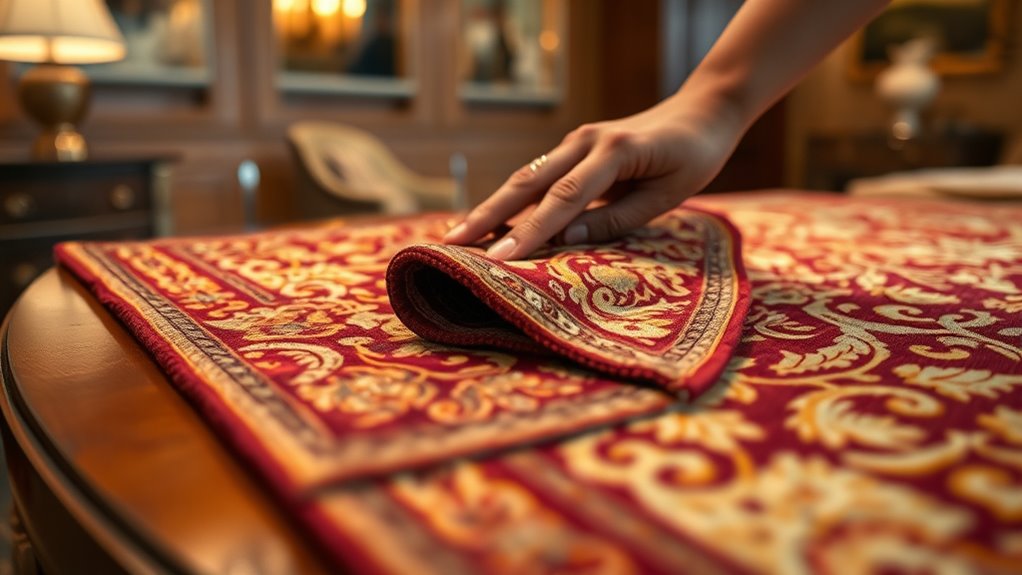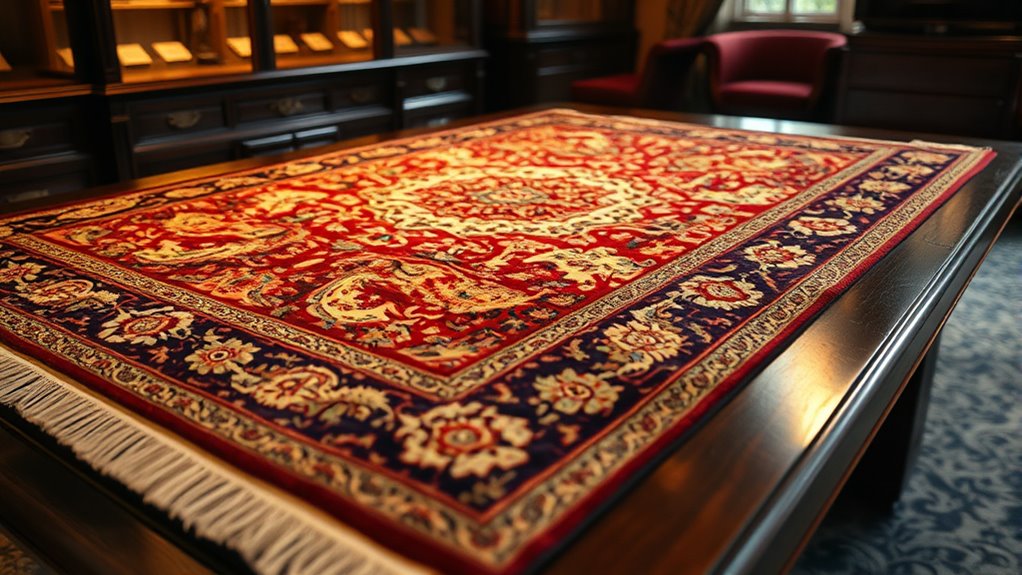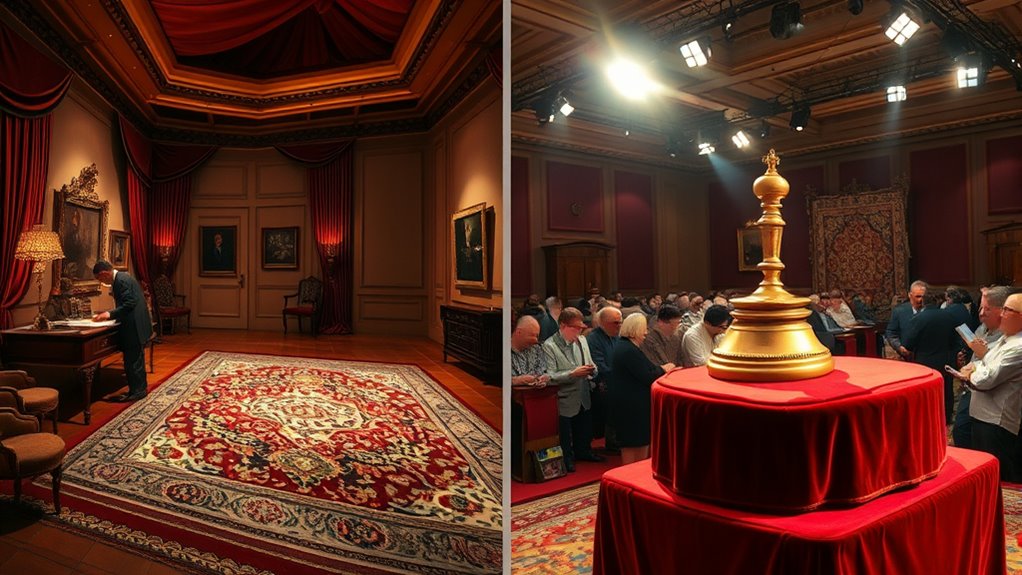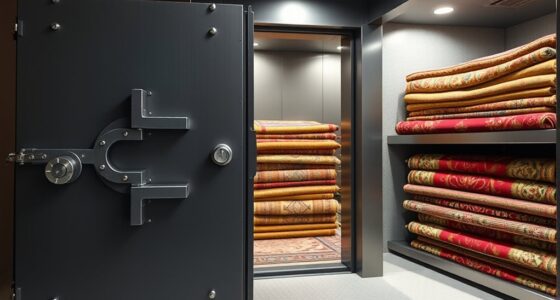When selling high-value carpets, private sales give you control, confidentiality, and personalized negotiations, ideal if you value discretion and direct communication. Auctions, on the other hand, foster competition, attract serious bidders, and can boost your carpet’s final price through energetic bidding. Your choice depends on whether you prioritize control or maximum exposure. To make the best decision, understanding the key differences and how to prepare will help you meet your goals more effectively.
Key Takeaways
- Private sales offer confidentiality, direct negotiation, and flexible terms, ideal for discreet transactions of high-value carpets.
- Auctions create competitive bidding, potentially increasing final price and attracting serious collectors and motivated buyers.
- Private sales provide more control over pricing and timing, while auctions generate excitement and market exposure.
- Valuation accuracy is crucial in both methods to prevent undervaluation or overpricing risks.
- Choose private sales for discretion and control; opt for auctions to maximize sale price and market visibility.
The Benefits of Private Sales for High-Value Carpets

Private sales offer significant advantages when it comes to high-value carpets. They allow you to engage in private negotiations, giving you direct communication with potential buyers. This personalized approach helps you better understand the buyer’s needs and showcase the unique qualities of your carpet. Confidential transactions ensure privacy, protecting your identity and the details of the sale from public scrutiny. This discretion is especially important for high-value items, where you might prefer to avoid public attention or speculation. Additionally, private sales can be quicker and more flexible, allowing you to set terms that work best for both parties. By choosing private sales, you can also better manage transaction security and reduce the risk of fraud or disputes. Overall, this method provides a secure, discreet environment that can lead to a smoother, more controlled selling experience for your valuable carpets.
How Auctions Can Maximize Your Carpet’s Value

While private sales offer control and discretion, auctions can reveal higher value for your high-end carpets by fostering a competitive environment. An auction’s energy drives bidders to bid more aggressively, often surpassing expectations. Exclusive consignments attract serious collectors, enthusiastic to compete. Auction house branding enhances credibility, drawing in motivated buyers. Imagine this: bidding atmosphere can significantly influence final prices, as the lively environment encourages participants to increase their bids.
Key Differences in Selling Process and Negotiation

When choosing between private sales and auctions, understanding the differences in the selling process and negotiation is essential. In private sales, you have more control over pricing strategies and can negotiate directly with buyers, often leading to tailored deals. Auctions, however, create a competitive environment that can drive prices higher but limit your negotiation opportunities. Additionally, considering sustainable practices can influence your decision, as certain methods may align better with environmentally conscious selling strategies.
Key differences include:
Key differences include flexible pricing, buyer engagement, and negotiation dynamics.
- Pricing strategies: Private sales allow flexible pricing, while auctions set a starting bid.
- Buyer engagement: Auctions attract multiple bidders, increasing excitement and competition; private sales rely on targeted outreach.
- Negotiation dynamics: Private sales involve direct negotiation, whereas auctions culminate in final bids without further bargaining.
Knowing these distinctions helps you choose the method that aligns with your goals for selling your high-value carpet.
Assessing the Risks and Rewards of Each Method

When choosing between private sales and auctions, you need to consider how accurately each method values your asset. You might find that private sales offer more control but can lack transparency, while auctions can create more visibility but feel less predictable. Weighing these risks and rewards helps you make a smarter decision aligned with your goals. For instance, understanding the market dynamics of high-value carpets can significantly influence your choice.
Valuation Accuracy Challenges
Evaluating the risks and rewards of private sales versus auctions requires understanding the inherent challenges in accurately valuing assets. Market fluctuation can make it difficult to determine a true worth, as prices shift rapidly. Relying solely on an expert appraisal might not account for recent market changes, leading to undervaluation or overvaluation.
Be aware of these valuation challenges:
- Fluctuating market conditions affecting price estimates
- Subjectivity in expert appraisals
- Limited comparables for high-value carpets in private sales
These factors can cause discrepancies, impacting your decision-making. Accurate valuation is vital to avoid undervaluing your carpet or overestimating its worth, which could either reduce potential profit or expose you to financial risk. Understanding market fluctuation in the context of collectible assets can help refine valuation strategies.
Sale Transparency and Control
Sale transparency and control markedly influence your ability to make informed decisions and manage risks effectively. With private sales, confidentiality concerns often limit disclosure, protecting seller and buyer identities but reducing market visibility. Conversely, auctions promote transparency, showcasing high-value carpets to broader audiences but risking exposure of sensitive details. Consider this:
| Aspect | Private Sale | Auction |
|---|---|---|
| Confidentiality | High, preserves buyer exclusivity | Lower, details openly shared |
| Market Visibility | Limited, niche buyers | Wide exposure |
| Control | Greater, negotiate terms directly | Less, dictated by auction rules |
Choosing between them depends on your priorities: privacy and control versus market reach and transparency. Balancing these factors helps you navigate risks and rewards effectively.
Tips for Preparing Your Carpet for Sale

Getting your carpet ready for sale starts with a thorough cleaning to remove dirt, stains, and odors that could turn off potential buyers. Cleanliness profoundly impacts first impressions and helps highlight your carpet’s value. Use effective cleaning tips to guarantee it looks its best. Consider professional steam cleaning for deep dirt removal and fresh scent. Presentation staging also matters—arrange furniture to showcase the carpet’s beauty and avoid clutter. Additionally, repair any visible damage, such as frayed edges or loose threads, to boost appeal. Keep the carpet odor-free and well-maintained, as scent plays a role in perception. Remember, a clean, well-presented carpet not only attracts buyers but can also increase its perceived value, making it easier to sell at a desirable price. Moreover, understanding market trends can help you time your sale for maximum return.
Deciding Which Selling Method Fits Your Goals

Choosing the right selling method depends on your specific goals and circumstances. If you want to control market timing and sell when buyer interest is high, auctions can create urgency and attract competitive bidding. They’re ideal if your carpet appeals to collectors who value transparency and quick sales. Conversely, private sales give you more control over timing and allow you to tailor offers based on buyer preferences. If you prefer a discreet process or want to negotiate directly for a higher price, a private sale might suit you better. Consider whether your priority is speed, anonymity, or maximizing value. Understanding your goals helps you decide whether to leverage market timing with auctions or focus on personalized negotiations through private sales. Additionally, incorporating professional marketing techniques can enhance your chances of achieving the best outcome in either approach.
Frequently Asked Questions
How Does Authentication Impact the Sale of High-Value Carpets?
You realize authentication importance when selling high-value carpets, as it confirms their genuine origin and quality. Certification standards play a vital role, providing buyers with confidence and trust in your carpet’s provenance. Proper authentication helps you avoid fakes and increases your bargaining power, especially in private sales or auctions. Ultimately, authenticating your high-value carpets enhances their desirability, ensuring you get the best price and a smooth, credible transaction.
What Legal Considerations Should Sellers Be Aware Of?
Think of legal considerations as the map guiding your sale through uncharted waters. You should clearly understand contract obligations to avoid misunderstandings, ensuring all terms are transparent. Additionally, be aware of tax implications that could turn your profits into a sinking ship if overlooked. Consult legal and tax experts to navigate these waters confidently, safeguarding your interests and ensuring a smooth sale of your high-value carpet.
How Do Market Trends Influence Private Sales Versus Auctions?
Market trends, like volatility and shifting buyer preferences, heavily influence how you sell high-value carpets. If the market’s uncertain, private sales might offer more control and confidentiality, helping you avoid fluctuations. Conversely, during stable periods, auctions can attract enthusiastic buyers and potentially fetch higher prices. Staying aware of current market conditions helps you choose the best selling method, aligning with buyer demand and maximizing your return.
Can a Carpet’s Provenance Affect Its Sale Method Choice?
Your carpet’s provenance can make or break its sale method! If it has legendary carpet history or impeccable provenance documentation, you’ll want to showcase its story in a high-profile auction to attract collectors craving exclusivity. Without that prestige, private sales might be your best bet, offering personalized storytelling and trust. Provenance adds invaluable credibility, turning your high-value carpet into a priceless treasure that commands top dollar.
What Are the Typical Timeframes for Closing Each Sale Type?
When you’re selling a high-value carpet, the timeframe depends on your sale method. With private sales, you can control the pace, focusing on thorough sale preparation and personalized buyer engagement, which may take weeks or months. Auctions tend to be quicker, often closing within days or a few weeks after the event, as they rely on the auction schedule. Your choice affects how quickly you can finalize the sale.
Conclusion
Choosing between private sales and auctions is like steering a vast ocean—each wave offers different treasures and challenges. Trust your instincts and consider your goals to steer toward the best course. Whether you sail smoothly with a private deal or ride the exhilarating storm of an auction, remember that your high-value carpet’s true worth is waiting to be uncovered. Set your course wisely, and watch your prized piece shine like a beacon in the right harbor.









